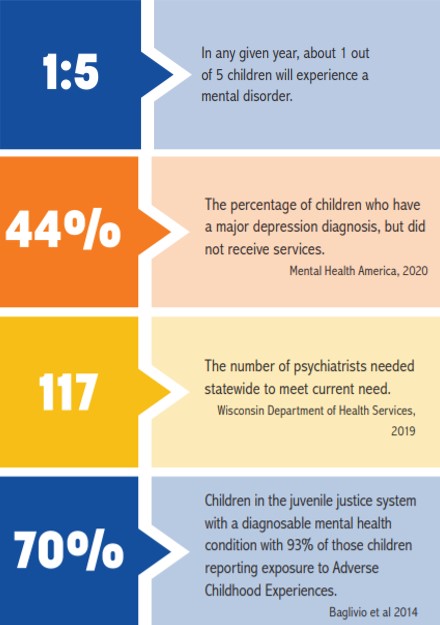
By Kate Bennett and Joshua Mersky
According to the 2019 annual report by the Office of Children’s Mental Health (OCMH), Wisconsin continues to see trends such as increasing rates of diagnosed mental illness in young children and adolescents1,2, increasing rates of untreated depression and anxiety in youth3, and a significant lack of mental health providers available to the community.4 In our state, a common concern shared by families and clinicians alike is the accessibility of early intervention and quality mental health services.
The Trauma and Recovery Project is a five-year initiative that aims to increase access to evidence-based mental health services in southeast Wisconsin by leveraging partnerships between the Institute for Child and Family Well-being (ICFW) and Wisconsin’s Department of Children and Families (DCF), OCMH, and the Milwaukee Child Welfare Partnership (MCWP). Funded by the Substance Abuse and Mental Health Services Administration, one of the project’s primary foci has been on growing the number of clinicians that are trained to deliver trauma-responsive treatments such as Trauma-Focused Cognitive Behavioral Therapy (TF-CBT), Parent-Child Interaction Therapy (PCIT), and Child-Parent Psychotherapy (CPP).
The project has established a Center of Excellence at Children’s Wisconsin to accelerate the implementation and dissemination of these three identified best practices which serve children ages 0-18 and their families. During the first two years of the project, well over 100 clinicians in Milwaukee and Racine counties have received training in one of the project’s three identified evidence-based treatments. Trainings and consultation are provided by the project for a minimal cost to clinicians and their agencies, and training participants are offered continued access to web-based, intervention-specific communities of practice (CoPs) hosted by the Center of Excellence. In the past year alone, clinicians at the Center of Excellence have participated in over 40 hours of CoP video-conferencing sessions to consult on evidence-based practices, and they have served nearly 400 children. Based on current projections by the ICFW, more than 2,000 children will receive TF-CBT, PCIT, or CPP at the Center by the end of the five-year project. Learn more about implementation of these evidence based practices here.
Importantly, parents and youth are sharing their lived experiences through a Collective Impact process led by OCMH to address access to services and family need.5 This innovative and structured approach to systems change is helping to identify facilitators and barriers to mental health services that principally affect disadvantaged and underserved communities. Three committees have additionally been formed with membership from the Milwaukee and Racine communities to oversee the work of the Trauma and Recovery Project. One of the committees, Service Access and Family Engagement (SAFE), seeks to expand family voice by creating a collective culture focused on equity and authentic relationships that work toward shared goals and system strategies. As the SAFE committee continues to evolve, project partners recognize that it is critical to include families who have been participants of the project interventions and clinicians who have provided the interventions in future collaborative efforts.
One major barrier that must be addressed is stigma associated with mental health services, and research suggests that perceptions of stigma tend to be particularly common among racial and ethnic minority groups.6 Parent consumers who are members of the project’s Collective Impact process have expressed this concern, and they have been actively engaged in developing direct outreach and public messaging strategies to combat the issue.
Learn More
Office of Children’s Mental Health
Wisconsin Department of Children & Families: Wisconsin Trauma Project
Mental Health America
Sources

